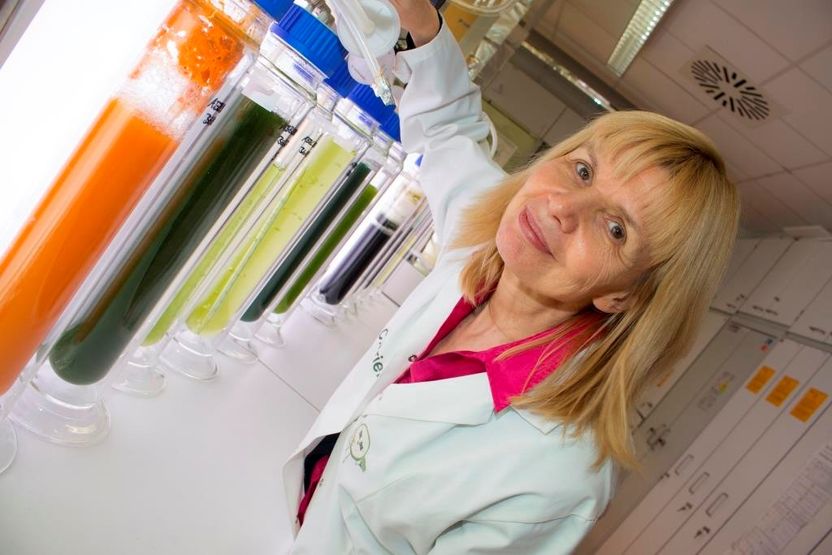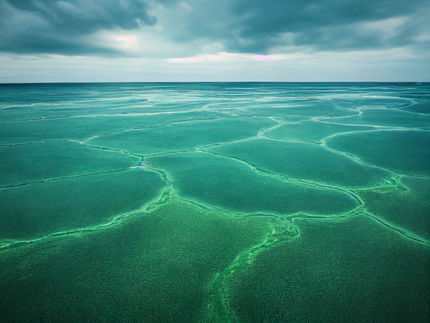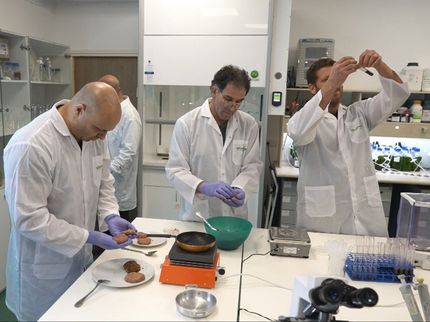Algae: Green multi-talents
Saxony-Anhalt has developed into a centre of algae biotechnology. From basic research and the construction of reactors to the development of active substances for nutrition, medicine and cosmetics, microalgae have a great future as a renewable raw material.

Professor Carola Griehl and her team at Anhalt University are investigating green, blue and red algae strains.
©Kathrain Graubaum
When Carola Griehl is on her way, her eyes often go on a discovery tour of algae. She has a keen eye for the green micro plants that can form wherever the environment is humid - in water, on rocks and house walls, even in the snow. In her last vacation, she says amusedly, she discovered a microalgae in a pond, which she actually does not yet have in her collection. That means something.
The Anhalt University of Applied Sciences in Köthen owns 300 algae strains. Carola Griehl is Professor of Biochemistry and heads the "Algae Biotechnology" working group. It is one of the leading algae experts in Germany. Whoever accompanies her to the laboratory quickly notices that her urge to research is coupled with passion. For good reason the scientist is called an "algae ambassador". Her message in a nutshell: "The green, blue and red microorganisms are true multi-talents. They can help us to cope with the major global problems," emphasises Carola Griehl and mentions climate change, the growing world population accompanied by declining food supplies and the finiteness of fossil fuels.
source of health-promoting ingredients
The algae researcher is in her element; she is enthusiastic about highlighting the attractiveness of algae. The one she found on holiday actually proved to be a special alga with a high content of omega-3 fatty acids. The professor talks about the development of new algae species as a source of health-promoting ingredients - such as unsaturated fatty acids, vitamins, proteins, blue dyes, carotenoids or other active substances. "They can reduce the risk of diet-related diseases in the ageing population," says the expert, stressing that certain active substances are also a focus for medical applications, such as brain development, the treatment of chronic intestinal inflammation or neurodegenerative diseases.
The importance of algae will also increase in agriculture - for example in the animal feed sector or as a fertilizer additive, as well as in cosmetics and as raw material producers for the energy and chemical industries.
From basic research to industrial use
"Saxony-Anhalt has developed into a centre for algae technology," says the university professor, referring to the increased potential in this state: in 2000, the world's first industrial photo-bioreactor plant for algae production in glass tubes of 500 kilometres was erected in Klötze in the old part of Brandenburg. At the same time, application-oriented algae research began at Anhalt University. Carola Griehl speaks of 40,000 species of algae classified in science. "But we still know far too little about their usable ingredients. Only about 15 microalgae are used industrially. That's why we're building our own algae strain collection. We are investigating the use of microalgae found in nature all over the world."
As the next link in the value chain, the Fraunhofer Center for Chemical-Biotechnological Processes CBP was opened in Leuna in 2012. Here, laboratory processes are transferred to industrial scale. In 2013, the Anhalt University of Applied Sciences founded a biosolar centre in Köthen in cooperation with GICON-GmbH. Results from basic research are further developed here up to industrial application. Since 2018, the Fraunhofer Institute for Cell Therapy and Immunology IZI in Halle and the Anhalt University of Applied Sciences in Köthen have been developing the joint research laboratory "Natural Product-Based Therapeutics" into a supraregional centre for algae-based drug research.
The alternative to coal and oil
With these and other partners from science and industry, Anhalt University of Applied Sciences is building up a network that will give itself a technical edge worldwide. Professor Griehl proudly refers to cooperative doctoral procedures, to the international interest in the exchange of students, guest scientists and lecturers as well as to international projects in the field of algae research. She just signed a contract with a Japanese partner. The aim is to research an algae that secrets petroleum-like hydrocarbons from the cell; important raw materials for the cosmetics and chemical industries that can also be used to generate energy.
"I am particularly attracted by the application-oriented research here, the lived transfer of knowledge," says Carola Griehl with bright eyes and is determined to show her "algae filling station". In the bladder columns converted into "milking apparatuses", this algae species is cultivated, which excretes oil similar to petroleum. The algae researchers from Köthen have succeeded in siphoning off the oil during biomass production. The scientist says that algae oil can be produced profitably on an industrial scale and presents another invention: The pilot plant contains photo bioreactors developed by GICON GmbH: Fir trees made of silicone tubes, which can be tempered. This allows the algae culture to be cooled on hot days so that it does not heat up to more than 35 degrees and the ingredients die.
For your sake with blue algae beer
"Of course, we want to use our technological pioneering role to bring the algae into play as an alternative in the development of an energy economy without oil and coal," says Professor Griehl. She talks about a recent initiative of visionaries who want to establish a Central German Algae Centre. The aim is to develop, certify and launch new algae-based products in order to strengthen the economic power of the region.
The blue algae beer of Jean Titze, the beer brewing professor for food technology, is a good toast to this. "It's not just the taste that's good. The algae's blue dyes even have an anti-inflammatory and anticarcinogenic effect," enthuses the algae ambassador.
Note: This article has been translated using a computer system without human intervention. LUMITOS offers these automatic translations to present a wider range of current news. Since this article has been translated with automatic translation, it is possible that it contains errors in vocabulary, syntax or grammar. The original article in German can be found here.





























































